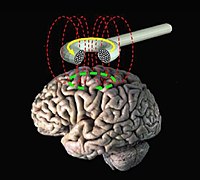
Photo from wikipedia
Aims of the present study were to investigate a wide array of psychological symptoms through validated psychometric tests, before and after 5 weeks of deep Transcranial Magnetic Stimulation (dTMS) in… Click to show full abstract
Aims of the present study were to investigate a wide array of psychological symptoms through validated psychometric tests, before and after 5 weeks of deep Transcranial Magnetic Stimulation (dTMS) in individuals with obesity, and to identify possible relationships with neuroendocrine parameters. Forty-five patients with obesity (33 F, 12 M; age 48.8 ± 9.9 years; body wt 97.6 ± 14.2 Kg; BMI 36.2 ± 4.2) were randomized into two groups: 26 received high frequency (HF) dTMS and 19 Sham stimulation for 5 weeks. At baseline and after the 5-week treatment, all patients underwent the following psychometric evaluations: Food Cravings Questionnaire-Trait (FCQ-T) and its subscales, Barratt Impulsiveness Scale-11 (BIS-11), State and Trait Anxiety Inventory (STAI-y1 and STAI-y2), and Beck Depression Inventory (BDI). Hormonal and neuroendocrine markers were assessed at the first and last dTMS session. By adjusting for baseline variables and treatment arms, a significant decrease in body wt and BMI was found in HF group, both with univariate (p = 0.019) and multivariate analyses (p = 0.012). Impulsivity significantly decreased in HF group, both with univariate (p = 0.031) and multivariate analyses (p = 0.011). A positive association between the impulsivity score change and the leptin level variation (p = 0.031) was found. The decrease of impulsivity together with the BMI reduction in individuals with obesity, treated with real stimulation, suggests that impulsivity may be a risk factor for obesity. Treatment with dTMS revealed to be effective in reducing both BMI and impulsivity by enhancing inhibitory capacity of Pre-Frontal Cortex (PFC), and modulating neuroendocrine system, especially leptin.
Journal Title: Endocrine
Year Published: 2021
Link to full text (if available)
Share on Social Media: Sign Up to like & get
recommendations!